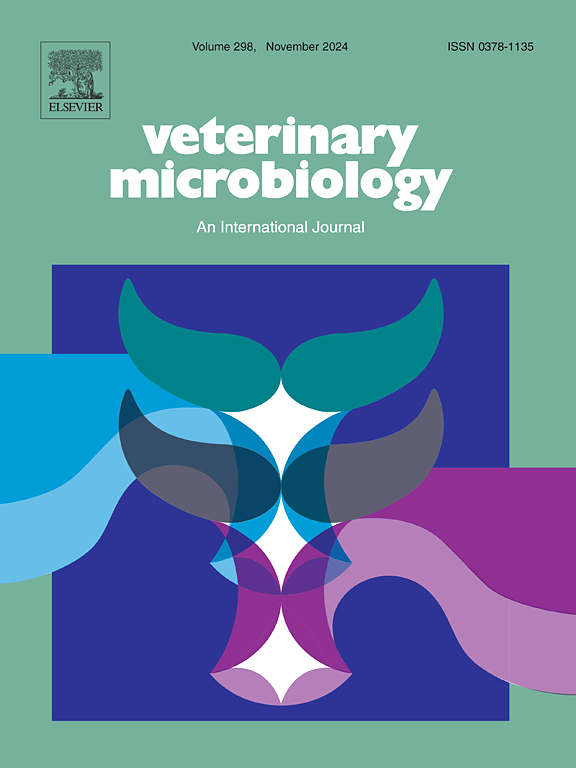全基因组CRISPR筛选揭示I型干扰素信号通路在新城疫病毒持续感染建立中的特殊作用
IF 2.7
2区 农林科学
Q3 MICROBIOLOGY
引用次数: 0
摘要
新城疫病毒(NDV)是一种对多种癌细胞敏感的强效溶瘤剂。不幸的是,一些癌细胞能够通过持续感染来抵抗ndv介导的肿瘤溶解。感染持续性的机制仍然知之甚少。本研究对非小细胞肺癌细胞(A549)进行全基因组CRISPR筛选,以确定NDV感染的关键宿主因子。有趣的是,在存活的细胞中建立了持续感染。CRISPR高通量筛选结果显示,在存活细胞中,I型干扰素信号通路成员(JAK1、STAT1、STAT2和IRF9)被鉴定为top hit。进一步研究发现,在A549细胞中I型IFN信号通路是完整的,NDV感染后会诱导剧烈的细胞因子风暴。NDV感染和细胞因子风暴均可诱导A549细胞死亡。我们进一步阻断了I型干扰素信号通路,I型干扰素信号通路的破坏促进了NDV的复制,但确实减弱了细胞因子风暴引起的细胞死亡。此外,与野生型A549细胞相比,I型干扰素信号通路受损的A549细胞更容易建立持续感染。这些发现表明,I型干扰素信号通路通过调节抗病毒免疫和细胞因子风暴诱导细胞死亡,在持续感染中起决定性作用。本文章由计算机程序翻译,如有差异,请以英文原文为准。
Genome-wide CRISPR screen reveals specific role of type I interferon signaling pathway in Newcastle disease virus establishment of persistent infection
Newcastle disease virus (NDV) is a potent oncolytic agent that exhibits sensitivity to a wide range of cancer cells. Unfortunately, some cancer cells are able to resist NDV-mediated oncolysis, by developing a persistent infection. The mechanism of persistency of infection remains poorly understood. In this study, a genome-wide CRISPR screen was conducted on non-small cell lung cancer cells (A549) to identify key host factors for NDV infection. Interestingly, a persistent infection was established in the surviving cells. CRISPR high-throughput screening results showed that members of the type I interferon signaling pathway (JAK1, STAT1, STAT2 and IRF9) were identified as top hits in the surviving cells. Further studies found that the type I IFN signaling pathway is intact in A549 cells, and a violent cytokine storm was induced after NDV infection. Both NDV infection and cytokine storm can induce cell death in A549 cells. We further blocked the type I interferon signaling pathway, and impaired type I interferon signaling pathway promoted NDV replication, but it did attenuate cell death induced by cytokine storm. Furthermore, persistent infection is more easily established in type I interferon signaling pathway-impaired A549 cells than in wild-type A549 cells. These findings suggest that the type I interferon signaling pathway plays a decisive role in persistent infection by regulating the antiviral immunity and cytokine storm inducing cell death.
求助全文
通过发布文献求助,成功后即可免费获取论文全文。
去求助
来源期刊

Veterinary microbiology
农林科学-兽医学
CiteScore
5.90
自引率
6.10%
发文量
221
审稿时长
52 days
期刊介绍:
Veterinary Microbiology is concerned with microbial (bacterial, fungal, viral) diseases of domesticated vertebrate animals (livestock, companion animals, fur-bearing animals, game, poultry, fish) that supply food, other useful products or companionship. In addition, Microbial diseases of wild animals living in captivity, or as members of the feral fauna will also be considered if the infections are of interest because of their interrelation with humans (zoonoses) and/or domestic animals. Studies of antimicrobial resistance are also included, provided that the results represent a substantial advance in knowledge. Authors are strongly encouraged to read - prior to submission - the Editorials (''Scope or cope'' and ''Scope or cope II'') published previously in the journal. The Editors reserve the right to suggest submission to another journal for those papers which they feel would be more appropriate for consideration by that journal.
Original research papers of high quality and novelty on aspects of control, host response, molecular biology, pathogenesis, prevention, and treatment of microbial diseases of animals are published. Papers dealing primarily with immunology, epidemiology, molecular biology and antiviral or microbial agents will only be considered if they demonstrate a clear impact on a disease. Papers focusing solely on diagnostic techniques (such as another PCR protocol or ELISA) will not be published - focus should be on a microorganism and not on a particular technique. Papers only reporting microbial sequences, transcriptomics data, or proteomics data will not be considered unless the results represent a substantial advance in knowledge.
Drug trial papers will be considered if they have general application or significance. Papers on the identification of microorganisms will also be considered, but detailed taxonomic studies do not fall within the scope of the journal. Case reports will not be published, unless they have general application or contain novel aspects. Papers of geographically limited interest, which repeat what had been established elsewhere will not be considered. The readership of the journal is global.
 求助内容:
求助内容: 应助结果提醒方式:
应助结果提醒方式:


